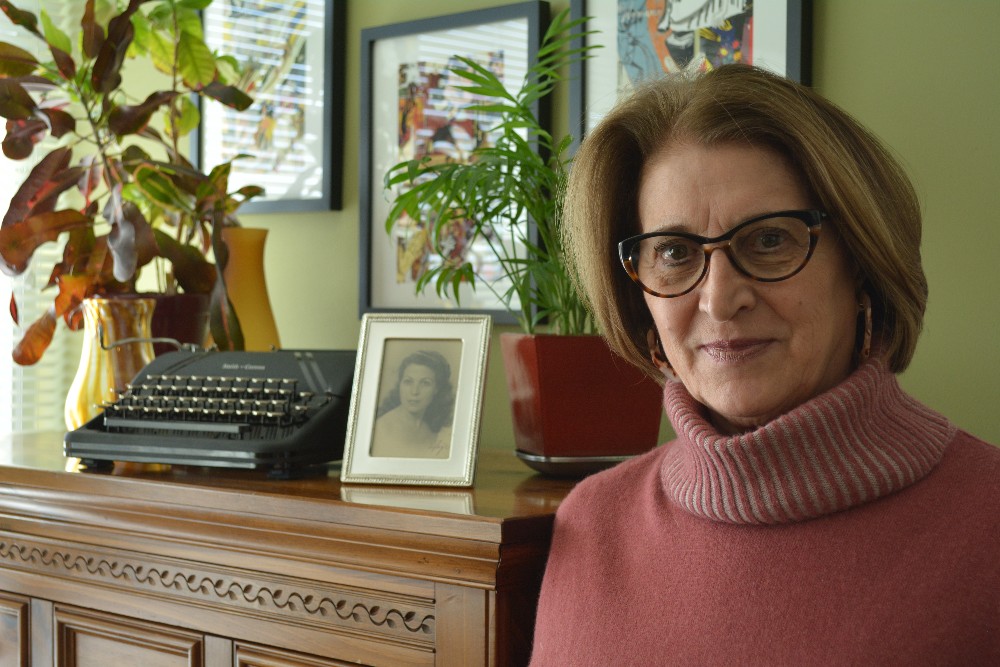
Philadelphia author blends memoir and history to explore her family’s experience during the Spanish Civil War
In her new book, Philadelphia-based writer Concha Alborg delves into the untold stories of her parents’ lives during the Spanish Civil War described in love…
It was a scene straight out of a film script. In an old attic, a daughter searched through her deceased father’s possessions. She sifted through stacks of old papers from his work as a professor, ready to be done for the day -- until her colleague urged her to lift up one last stack and explore further.
In the process of turning over that final stone, Dr. Concha Alborg discovered what she describes as a “treasure trove”: 800 letters, numbered and in near-perfect condition, that represent almost the entirety of her parents’ correspondence during their years as young, separated lovers during the Spanish Civil War.
In a recent interview with AL DÍA, which you can listen to in full on the podcast episode below, Alborg described her sense of surprise, wonder, and fear about how she could tackle the story from her family‘s past that fell into her hands.
“In a way, it was a gift to find the letters, and I felt very privileged as a writer to find this, and it was also a big responsibility,” Alborg said.
The writer and former professor of contemporary Spanish literature at St. Joseph’s University in Philadelphia said that the initial expectation was that any book she would write based on the letters would center on her father, Juan Luis Alborg, who was a famous literary critic and historian.
But Alborg said that changed as she read the letters and discovered a side of her mother, Concepción Carles, which she had never known.
“She died young, no one else was going to write about her, she was a typical woman that was, not in a bad way, hidden behind the fact that my father was so well known,” Alborg said.
When describing both of the young lovers’ letters, Alborg said her father’s are “beautiful,” while her mother’s are “moving.”
Her mother was the oldest of seven children, and grew up under the first Spanish Republic, one of the most liberal governments in Europe at that time.
Alborg, though, was more familiar with the woman who had lived under the repression and fear of Franco’s regime, which lasted until the dictator’s death in 1975. Alborg’s mother often repeated phrases like, “If you keep your mouth closed, flies won’t come in,” and spoke little of her experiences during the Civil War, before her children were born.

But in the letters, the writer discovered a completely different woman: one who worked full-time for the Republic’s Ministry of Propaganda, and rushed to donate blood at the hospital in Valencia after she heard the bombs falling at night. A woman who stood in line for rations and managed to run a household consisting of her six younger siblings and her at-times ill mother, all while still finding the energy to go on excursions and catch movie showings at the local cinema when she could.
“That’s why the title is, ‘My Mother, That Stranger,’ because the first time, and even now when i read the letters, I read it and I say, ‘Who is this woman?’,” Alborg said.
Valencia, where Concepción, also known as Conchita, was living during the war, was the capital of the Spanish Republic and one of the hardest-hit areas of Republican territory, bombed by German and Italian planes supporting the fascist Franco’s cause. Concepcion witnessed the wounded, and when she donated blood, sat side by side next to the patient, due to the limits of technology at that time.
Though Conchita’s lover, Juan Luis Alborg, was fighting in the Republican Army, he was in the rear guard since he was a university student, and never saw time in the trenches.
RELATED CONTENT
“In some ways she is the one that had the most active role during the war, and this was really a discovery,” Concha Alborg said of her mother.

Alborg said that the discovery of her mother’s experiences of the war as she recorded them in the well-organized, perfectly preserved letters, though significant on a personal level, also has a broader relevance due to the dearth of accounts of women’s and citizens’ stories of wartime throughout history. In general, researchers estimate that women’s stories account for just 0.5% of recorded human history.
“When we read a history book, everything is from the point of view, mostly male, because those were the ones fighting the war, and from the front lines, and we know very little, many times nothing about the civilian population,” Alborg said.
In the book, Alborg also describes some of the hardships the family encountered, when they immigrated to the U.S. in 1961 -- another story which, Alborg, said many people “do not understand” if they have not experienced it.
In the course of her extensive research and writing, Alborg said the most surprising revelation of the project was simple: “I discovered myself,” she said.
“When I read my mother, and more than when I read her, when I wrote about her, I realized how much I was like she was,” the writer said.
Alborg is currently working on another book based on the letters, this time in Spanish, and centered on her father’s life. The premise is that the letters she discovered from her father from that era in many ways are his “most intimate literature,” since he never was able to write an autobiography or memoir.
Alborg will be speaking at Taller Puertorriqueño on Saturday, March 14, from 3-5 p.m., as part of the organization’s free “Meet the Author” series. For more events and readings, and information on the author, you can visit her website.











LEAVE A COMMENT:
Join the discussion! Leave a comment.